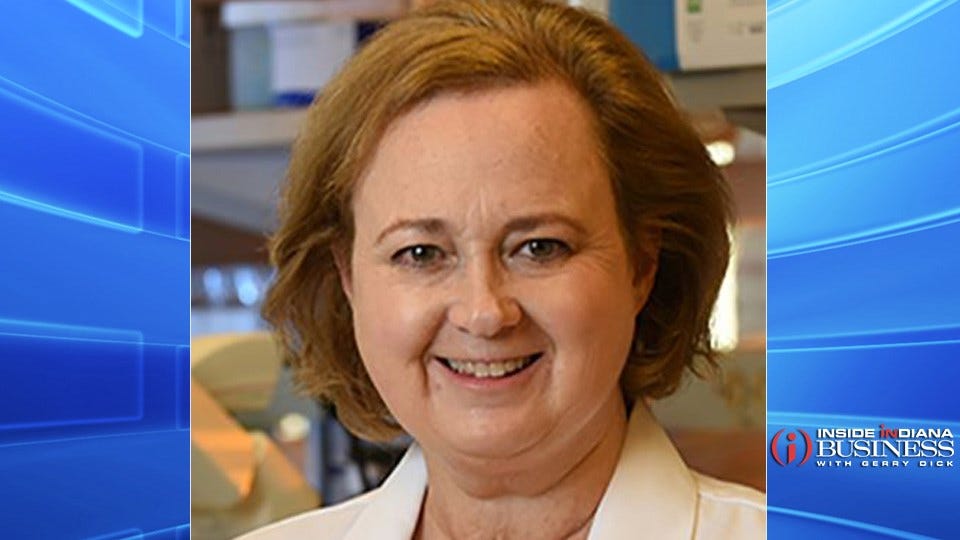Two young Hoosiers inspire leaps in cancer research

Subscriber Benefit
As a subscriber you can listen to articles at work, in the car, or while you work out. Subscribe NowAs an IU School of Medicine researcher in the field of childhood cancer, the vast majority of our work is done with de-identified tumors, but sometimes we get to meet the children we are trying to help. When that happens, I am consistently inspired and motivated by those incredible young people we encounter.
One of the most rewarding parts of our research includes those times when we can see progress being made to treat the terrible diseases that can affect Indiana’s youngest patients. Most recently, our team found a combination therapy that significantly slows tumor growth in models, built from cells taken from Tyler Trent’s tumors.
Tyler Trent’s legacy
Tyler Trent was a Purdue University student and football superfan who died on January 1, 2019, after waging a long and valiant fight against an aggressive form of bone cancer called osteosarcoma. Some of my colleagues and I visited him at his home before his death to share our research, and we have made more strides since then.
Our team found a variation in Tyler’s tumors (TT1 and TT2) called the MYC-RAD21 signature, which has been found in tumors that have a high risk of relapse. There are two drugs that can block its effects, a Chk1 inhibitor and a bromodomain inhibitor. Our researchers tested each of those drugs individually, as well as in combination.
What we found in Tyler’s model is we can take one of the drugs, the Chk1 inhibitor or the bromodomain inhibitor, and we can administer it in models with the TT2 tumor and we get the tumors to stop growing some, compared to a control. However, when we put the two drugs together, we block the growth of the tumors substantially. Importantly, data so far suggest that the combination therapy is well tolerated and does not affect normal cells or organs.
We found that the combination therapy worked during a four-week treatment, but the tumor started growing again after stopping the therapy. Our next steps include a better understanding of how the drugs work together, optimizing combination therapy, and how the tumors adapt to the treatments. Finding a cure for pediatric sarcomas, including osteosarcoma, is one of the goals of the Indiana University Grand Challenges Precision Health Initiative.
Inspired by Tyler’s desire to help
Tyler’s legacy as a research advocate started years ago while he was a patient at Riley Children’s Health. He donated several tumor samples to cancer researchers at IU School of Medicine and nationally advocated that others do the same.
Tyler also encouraged people to donate money to support research. People have donated millions of dollars for cancer research in Tyler’s name, including approximately $180,000 for the Tyler Trent Cancer Research Endowment for Riley Hospital. The Trent family and Riley Children’s Foundation worked together to create the endowment fund, which supports pediatric research being conducted by IU School of Medicine researchers. Our researchers appreciate all the efforts to raise research dollars. Funding through community involvement is critical to ultimately discovering a cure for cancer. Funding keeps the research enterprise running smoothly and helps us push the limit on what can be explored.
While we still have much work to do, we are hopeful that new therapies for osteosarcoma will be possible in the near future. Tyler truly left us a legacy, and he is not the only one.
Christian Daugherty’s impact
Christian Daugherty came to Riley Hospital from Albany, Indiana, when he was six years old, after he started getting bad headaches. Doctors found out he had a cancerous tumor in his brain, prompting surgeons to operate on the boy four times within a year.
Christian’s treatments were supported by the donor-funded precision genomics team at Riley, including our team of researchers. We were able to find a target and keep the tumor from growing for several months. In that time, Christian and his family became spokespeople for Riley, encouraging others to donate to support research being done.
His family, in partnership with the Riley Children’s Foundation, created Christian’s Flash to a Cure Fund, named after his favorite super hero, The Flash. People have donated thousands of dollars in his name to support my team’s cancer research.
Christian died on July 31, 2019, a little more than six months after we lost Tyler Trent. Christian was just 8 years old then, but had already made a huge impact in his young life.
Looking ahead with hope
Even though it has been devastating to lose two young advocates for childhood cancer research within a year, we have hope for the future. While our team works in the lab, we think of Tyler and Christian, as well as the many children we don’t know yet who will bravely battle devastating diseases. We continue our quest to look for possible treatments and cures with all of them in mind, and will keep you updated on our progress moving forward.
Karen Pollok, PhD, is an Associate Professor of Pediatrics at Indiana University School of Medicine with secondary appointments in the Departments of Pharmacology & Toxicology and Medical & Molecular Genetics. She serves as Director of the In Vivo Therapeutics and Angio Biocore Shared Resource Facilities for the Indiana University Simon Comprehensive Cancer Center. She also serves as the Basic Science Leader of the Brain Tumor Working Group and co-Director of the Signature Center for Brain and Neurological Tumors.
